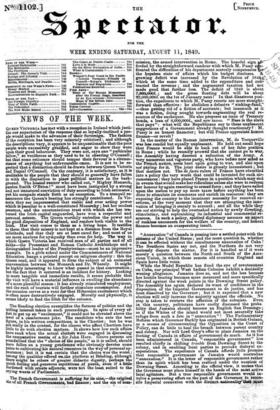The French Government is suffering for its sins,—the original sia
of all French Governments, bad finance; and the sin of com-
forded by the straightforward candour with which M. Passy fronted the difficulties of his department scarcely compensates rarer the hopeless state of affairs which his budget discloses. X.
growing deficit was increased by the Revolution of 18144 Yr. which at the same time added to the expenditure and con-, \ \ev
tracted the revenue ; and the augmented taxation had not made good that further loss. The deficit of 1849 is about 7,360,000/. ; and the gross floating debt will be about 22,000,000/. on the 1st of January next! In that disastrous posi- tion, the expedients to which M. Passy resorts are more straight- forward than effective : be abolishes a delusive "sinking-fund," —thus getting rid of a fiction of accounts; but inasmuch as it was a fiction, doing nought towards augmenting the real re- sources of the exchequer. He also proposes an issue of Treasury
bonds, a loan of 8,000,0001., and nen, taxes. " Base is the slave
that pays": what will the Republicans say to these unpleasant suggestions of a Government already thought reactionary M. Passy is an honest financier ; but will France appreciate honest finance—or revolt ?
In the matter of the Roman intervention, M. de Tocqueville was less candid but equally unpleasant. He held out small hope
that France would be able to back out of her false position
in Rome ; while he roundly avowed that she cannot go to war, the Assembly having decreed a reduction of the Army. A very numerous and vigorous party, who have before now acted as
the French nation, seem bent upon going to war, and also upon not paying for it. The joint desire is grossly inconsistent ; but that matters not. The de facto rulers of France have stumbled
into a policy the very worst that could be invented for such cir- cumstances: they have placed France in a position which may end in events that would make her ridiculous unless she were to redeem her honour by again resorting to armed force ; and they have called upon the nation to pay up more taxes before anything has been done to stimulate its commerce and enrich its resources: they are exposing the country to the imminent necessity for renewed ex- ertions, at the very moment that they are attempting the inno- vation of bringing it sternly to account ; and all the while they
are not striving to help the overtasked nation by newly directing,
stimulating, and replenishing its industrial and commercial re- sources. In such a policy, spirited diplomacy assumes an aspect of reckless unconcern for the welfare of the country, and honest finance becomes an exasperating insult.


























